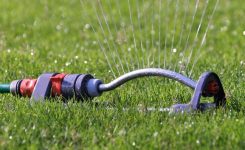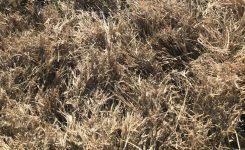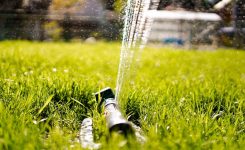Lawn Care Services, Lawn Treatment Solutions Blog
5 Weed-Killing Alternatives to Roundup
 The controversy over the adverse health effects of Glyphosate, which is the main ingredient in Roundup, is well documented. It is also important to note that there may be even more toxic lawn chemicals than Glyphosate on the shelf at your garden center.
The controversy over the adverse health effects of Glyphosate, which is the main ingredient in Roundup, is well documented. It is also important to note that there may be even more toxic lawn chemicals than Glyphosate on the shelf at your garden center.
We at Crownover Green think there are good reasons to be cautious about spraying a toxic substance in areas where our loved ones (people and pets) relax and play.
In general, we think it is a good idea to reduce the use of chemicals as much as possible to keep them out of our public water supply (chemicals sprayed in the lawn drain into lakes and streams when it rains).
Here we offer five options for addressing weeds and grass in non-lawn areas:
Option 1: Hand-pulling.
Pulling weeds is the safest, most effective way to eliminate them. This method provides instantaneous results.
There are a variety of weed pulling tools ranging from less than $10 for a very basic hand tool to about $50 for one that enables you to pull weeds without even bending over. Weed pulling tools are especially useful on weeds that have a deep taproot such as dandelions. Pulling every weed on your property may not be a viable option, and certain weeds with fibrous or rhizomatous root systems cannot effectively be removed.
Option 2: Weed Torch.
A weed torch, which is powered by a small propane canister, can be purchased for less than $50. Burning weeds is effective, provides instantaneous results, and involves less elbow grease than hand-pulling. However, there is an obvious safety concern. Please be careful.
Option 3: Boiling Water.
Yes, water. Boiled. It’s actually very effective and works quickly, but is only practical if you have just a few weeds to kill. If you have a lot of weeds, it could take a while to boil enough water to kill them all. Also, please be careful.
Option 4: Vinegar.
Pour common 5% household vinegar into a spray bottle, add a couple drops of dish soap, and spray it on your weeds on a hot sunny day. The soap helps the vinegar stick to the foliage of the weed and many weeds will shrivel within an hour or two. Grassy weeds and waxy broadleaf weeds will need a follow-up application. Remember to avoid spraying the grass you want to keep. The advantages of vinegar are that it is cheap, fairly safe, easy to get, and quick to apply to a large number of weeds.
Option 5: Other Safer Sprays
There are several natural and/or certified organic products on the market, and the big box garden centers usually stock a couple of them. At local garden centers or online you might find 20% or 30% horticultural vinegar or products that contain citric acid, cinnamon oil, clove oil, or herbicidal soap that can be used to spray weeds. Again, avoid spraying any plants you want to keep.








